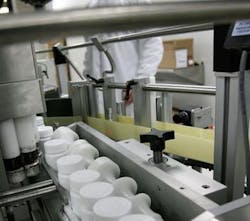Could Blockchain Solve Pharma’s DSCSA Challenges?
One of the biggest problems pharmaceutical companies encounter as they try to comply with the U.S. Food & Drug Administration’s Drug Supply Chain Security Act (DSCSA) is how to securely exchange information between different parties. There are many groups and technologies that can help meet regulatory requirements, but right now there are no rules of engagement. And there is yet to be one structured and standardized approach that would work with any company’s applications and serialization architecture.
But, if you’ve been exploring the options, you’ve probably heard about blockchain technology. This unalterable peer-to-peer record-keeping system could be what the life sciences industry needs to solve its interoperability, data security and serial number track and trace challenges.
Blockchain is a distributed ledger of transactions that enables communities to record and share information. It is best known as the core component of Bitcoin digital currency, but is quickly expanding into other applications. Blockchain is secure by design, using cryptography to allow participants on the network to add transactions. Blockchain serves as a public ledger for all transactions while guaranteeing authenticity of records and content across organizations.
The reason blockchain technology could be a DSCSA game changer is that each validated transaction creates a block that attaches to the chain of blocks before it, thereby creating an easy-to-follow trail. Blockchain is not a central repository and works with any format of information. Most importantly, it would not allow drugs into the system that did not come from the originating manufacturer. It is this data integrity that generates trust—an important element in the chain of custody.
Though some say blockchain may just be more technology hype, Deloitte recently released the results of a survey that show blockchain emerging as a key business focus for U.S. companies. According to Deloitte, the 308 senior executives surveyed are primarily from the consumer packaged goods (CPG), manufacturing, technology, media and telecom sectors. But it is the healthcare and life sciences industries that have the most aggressive deployment plans of any industry, with 35 percent of the survey respondents in these industries saying their companies plan to adopt blockchain within the calendar year.
Indeed, blockchain could be very useful for managing drug safety and the supply chain as it can digitally track the ownership of assets. This is what makes it so appealing, according to the Center for Supply Chain Studies, which this month launched a six-month study on the practicality of using blockchain to meet key DSCSA security and partner trading challenges. Specifically, the appeal is that it is a distributed environment with no central authority. It is flexible, meaning anyone can participate at any time. There is an ease of connection through a single point of entry. And it can be used for a wide range of applications including recalls and clinical trials.
It sounds promising, but as the Deloitte survey points out, the biggest problem could be understanding the technology and implementing a blockchain project. The companies that have already committed to blockchain have invested $5-10 million or more.
Although this may be a more “open” approach, there is still the issue of having technical standards associated with blockchain that would encourage widespread adoption.
“It’s fair to say that industry is still confused to a degree about the potential for blockchain,” said David Schatsky, managing director at Deloitte. “More than a quarter of surveyed knowledgeable execs say their companies view blockchain as a critical, top-five priority. But about a third consider the technology overhyped.”
What do you think? Could blockchain be the technology the pharmaceutical industry needs right now?
About the Author
Stephanie Neil
Editor-in-Chief, OEM Magazine

Leaders relevant to this article:
